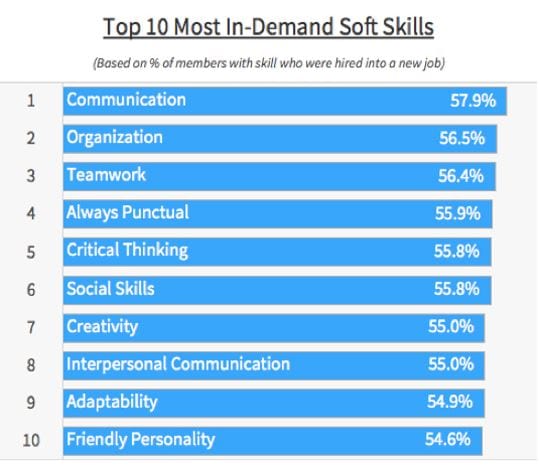Along with your job experience and knowledge, employers want new hires to have certain intangible ‘soft’ skills—but the majority of hiring managers believe that those skills are tough to find.
If you can show employers that you have the soft skills they want, you would have an edge over the other candidates and secure the job offer.
So what are employers’ most-wanted soft skills in new employees and how can you prove that you have them?
A recent LinkedIn analysis showed that the top 10 most in-demand soft skills are these:

You can prove that you have 9 out of those 10 soft skills in the interview. How? With a 30-60-90-Day Plan.
A 30-60-90-day plan is a written outline of your goals and action steps to be successful in your first 3 months on the job. In the interview, you use the plan as a tool to have a professional conversation with the interviewer about what you can bring to the job and make sure you are both on the same page.
How does bringing a 90 day plan show them that you have their most-wanted soft skills?
You show you have good communication skills when you have a back-and-forth, give-and-take conversation about how you will approach the job and what you will do to help the company.
You demonstrate your organization by laying out your ‘to-do’ list in a thoughtful, practical way.
You display teamwork by asking questions and getting the hiring manager’s input on your plan.
You showcase your critical thinking skills by what you choose to put into your plan to be successful in your new role.
You exhibit your social skills in how you introduce your plan and how you discuss it with the hiring manager.
You can reveal your creativity in a variety of ways, such as how you may need to get your own training in the first month; or what strategies or projects you may plan for your third month.
You share your interpersonal communication skills throughout your professional, productive conversation about what you will contribute to the company to further their goals.
You indicate your adaptability with your willingness to change your plan based on the input you receive from the hiring manager. (You bring your updated plan to the second interview.)
You highlight your friendly personality because your interview will go beyond the standard question-and-answer session of other interviews and help them get to know the ‘real’ working you, based on this interaction.
Along with all these valuable soft skills, you’re demonstrating your knowledge and work ethic with the details and strategies you include in your plan.
You’re answering interview questions in a much stronger way because you’ve had to do some research to create your 90-day plan.
You’re addressing the hiring manager’s 4 biggest concerns about any candidate.
Personally, no matter what job I was interviewing for, I would never go without a plan because I have experienced these plans for myself and sent many successful job candidates to interviews with them. They’ve made a huge difference for people who need to overcome a lack of experience, who need to come back from a layoff or an employment gap, or who just need to stand out in a competitive search.
I can’t urge you strongly enough to find out more about what 30 60 90 day plans are and create a plan for your next job interview.
Check out these plan templates here:
30-60-90-Day Plan for Sales Jobs
30-60-90-Day Plan for Management Level Jobs
30-60-90-Day Plan for Executives
